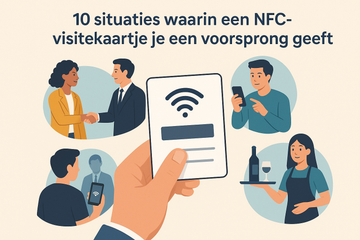Why Giving Is the Key to Successful Networking
Many people still see networking as a way to get something: a job, a client, or an opportunity. But those who only come to "get" often find that relationships remain superficial and short-lived. Successful networking is actually about giving . It's about building genuine relationships based on reciprocity and trust.
In this article you will read why a giver mentality makes your network stronger, how you can apply this in practice and how digital tools such as a digital business card (via mybusinesscard.nl ) can help with this.
1. Networking is building relationships, not transactions
The difference between effective networking and superficial connections lies in the intention. If you view a meeting as a transaction ("what can I get?"), the other person often senses that immediately. But when you connect with genuine interest and the desire to contribute, trust is built.
Relationships built on trust and giving are much more valuable in the long run. People remember who helped them, not who simply asked.
2. The Psychology of Giving
Why is giving so powerful? The answer lies in human psychology:
-
Reciprocity : People are naturally inclined to give something back to someone who has helped them.
-
Trust : Giving shows that you are not only thinking about yourself, which makes you more trustworthy.
-
Reputation : Helpers are more likely to be seen as experts and leaders, making them more likely to be sought out for opportunities.
Adam Grant already described this in his famous book Give and Take : givers often win in the long run, precisely because their network is closer and more loyal.
3. Practical Ways to Give in Networks
Giving doesn't always have to be big or complicated. Small gestures often make a difference. Some examples:
Sharing knowledge and expertise
Have you read an article relevant to a contact? Share it. Do you have experience with a problem someone is struggling with? Share your insights.
Introduce and connect
Introduce two people who could benefit from each other. These "warm introductions" are incredibly valuable.
Time and attention
Sometimes listening is the greatest gift you can give. Show genuine interest in what the other person is doing or needs.
Show rating
A compliment or a public recommendation on LinkedIn can have a big impact.
4. Practical examples
-
Freelancer : A freelance designer shares free tips with their network. This often leads to recommendations and, on a regular basis, new assignments.
-
Job seeker : Instead of simply requesting job openings, she shares jobs that aren't relevant to her but are to others. This increases her likeability.
-
Entrepreneur : By introducing others to potential clients, he builds a reputation as a connector. This indirectly generates new business.
These examples show that giving not only feels good, but also produces concrete results.
5. How LinkedIn and online networking can help
Online networking makes giving even easier. LinkedIn offers many possibilities:
-
Like, share, or comment on posts to give others visibility.
-
Writing recommendations for colleagues or partners.
-
Share content that is valuable to your network.
-
Introducing people through a personal message.
Anyone who does this structurally is more likely to be seen as someone who adds value – a reliable partner.
6. Balance between giving and setting boundaries
Of course, giving doesn't mean you should always sacrifice yourself. Smart networking is all about balance:
-
Give without expecting anything immediately in return.
-
At the same time, set limits on your time and energy.
-
Focus on giving within your area of expertise or interests, so that it suits you.
This way networking remains valuable and sustainable.
7. The Long Run: Why Giving Pays Off
In the short term, it sometimes seems like "takers" get results faster. But in the long run, the givers almost always win:
-
They have a stronger and more loyal network.
-
They are more often recommended.
-
Their reputation is steadily growing.
Giving creates a positive spiral: the more value you add, the more opportunities will naturally come back.






